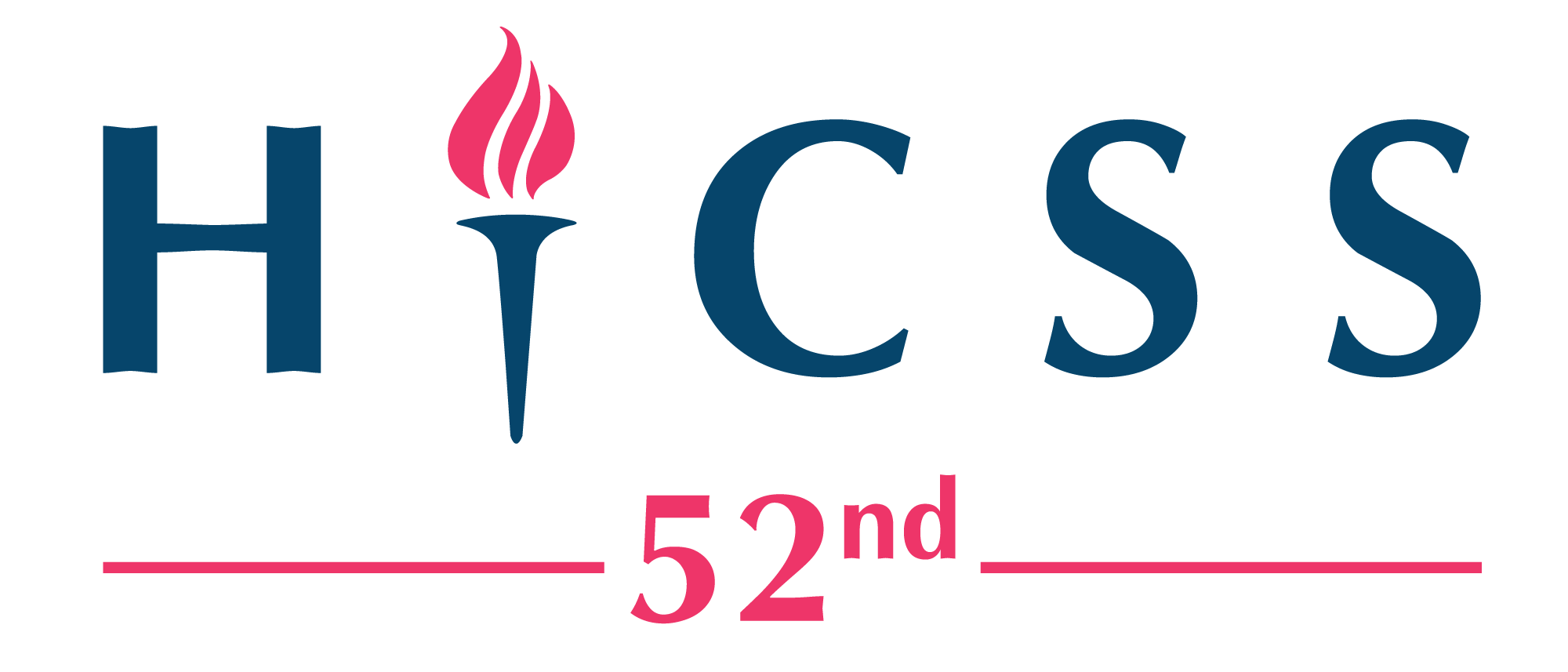HICSS - 52 Digital Government Track
52nd Hawaii International Conference on System Sciences
January 8-11, 2019 - Grand Wailea, Maui, HI, USA
Overview
Minitracks
Tutorials and Workshops
Other Links
Towards Government 3.0: Disruptive ICTs, Advanced Policy Informatics/Analytics and Government as a Platform



Minitrack Description
A multitude of complex and serious challenges and problems that modern societies face, in combination with the emergence of several new 'disruptive' Information and Communication Technologies (ICT), are gradually leading to the development of a new generation of ICT-enabled governance applications, referred to as 'Government 3.0'. Typical examples of such disruptive ICTs are big data, Internet of Things (IoT), artificial intelligence, intelligent bots and agents, business analytics, data mining, distributed ledger technologies and blockchain, gamification, and computer-based societal simulation. Government starts exploiting these technologies in order to improve its efficiency and effectiveness, and also to formulate better public policies for addressing the above challenges and problems of modern societies, based on advanced policy informatics/analytics. For the same purpose government also has to mobilize societal resources (skills, information, knowledge, creativity, assets of citizens and other non-government actors), and combine them with its own resources, in order to create policies and public value collaboratively, assuming gradually new roles of government 'as a platform'.
While Government 1.0 focused on the exploitation of ICT for improving internal efficiency and for providing services to citizens and firms through various electronic channels (e.g. Internet or mobile), and Government 2.0 focused on the use of Internet and social media for promoting transparency, citizens' participation, and collaboration, this new generation of Government 3.0 is focusing on:
- The smart utilization of the above new disruptive ICTs, for achieving unprecedented improvements on the internal processes and practices of government agencies, as well as on the services they offer to citizens and businesses, with parallel optimisation of resource consumption;
- The emergence of evidence-based decision and policy making, aiming to address the complex and serious challenges and problems of modern societies, leveraging the above disruptive ICTs, especially through the exploitation of big data, advanced modelling, data analytics and societal simulation;
- The mobilization and leveraging of both 'internal' public sector resources (skills, information, knowledge, creativity, assets) as well as 'external' societal resources (through engagement of a wide range of stakeholders, extended crowdsourcing, public value 'co-creation' processes and practices) towards the design and implementation of effective public policies for the above challenges and problems, and the provision of valuable public services.
This Mini-track aims to attract high quality research papers investigating various aspects of the development and evolution of Government 3.0. We promote a diversity of research methods to study the challenges of this multifaceted emerging discipline, including case studies, design approaches, best practices, literature reviews, quantitative and qualitative research.
Mini-track topics include, but are not limited to:
- New ways of utilising disruptive ICT's in government (such as big data, , Internet of Things (IoT), artificial intelligence, intelligent bots and agents, analytics, data mining, distributed ledger technologies and block-chain, gamification, simulation, etc) in a unifying and synthetic way, leading to major transformations in the public sector and the society
- Multi-disciplinary policy modelling, simulation and analytics approaches for policy impact assessment and contribution to evidence-based decision making and public policy formulation for tackling major societal challenges
- Advanced extended crowd-sourcing/citizen-sourcing and public value co-creation methods and practices, aiming at the mobilization and exploitation of societal resources from a wide range of stakeholders, for the design and implementation of effective public policies and the provision of valuable public services
- nNew models of governance and new roles of government 'as a platform'
- Synthetic ICT-enabled applications for policy making, aiming at tackling critical societal challenges and problems, such as increasing inequalities among citizens, regions and countries, poverty and social exclusion, unemployment, financial crises, pollution and climate change, ageing, migration and major demographic changes, shortages of food, water, energy and other important social goods, as well as pressures in education, health and safety services
- New epistemological approaches and theoretical foundations for the main elements of Government 3.0 (ontological resources, definitions, neighbouring scientific domains, taxonomies, research topics, future roadmaps and foresights)
- Evaluation frameworks, critical success factors, training needs, new needed skills, capacities and cultural changes, legal issues and implications, as well as possibly negative aspects and risks for Government 3.0
More information on the minitrack chairs:
Euripidis Loukis is Professor of Information Systems and Decision Support Systems in the Department of Information and Communication Systems Engineering of the University of Aegean. Previously he has taught at the Postgraduate Program 'Athens MBA' of the National Technical University of Athens and the Athens University of Economics and Business, at the University of Thessaly, and at the National Academy of Public Administration. He has an extensive experience as Information Systems Advisor at the Ministry to the Presidency of the Government of Greece, as well as National Representative of Greece in the Programs 'Telematics' and 'Interchange of Data between Administrations' of the European Union. He has conducted extensive research in the areas of e-government, e-participation, ICT adoption, business value and impact, and decision support systems, and has participated in numerous European and national research programs in these areas. Dr Euripidis Loukis is the author of more than 200 papers in international journals and conferences in the above areas. His papers have been honoured with prestigious international awards, such as the International Award of the American Society of Mechanical Engineers (ASME) in the area of Controls and Diagnostics, the Best Paper Award of the European and Mediterranean Conference on Information Systems, and the Most Innovative Research Contribution award of the IFIP EGOV-EPART Conference.
Yannis Charalabidis is Associate Professor in the Department of Information and Communication Systems Engineering of the University of Aegean. In parallel, he serves as Director of the Innovation and Entrepreneurship Unit of the University, designing and managing youth entrepreneurship activities, and Head of Information Systems Laboratory, coordinating policy making, research and pilot application projects for governments and enterprises worldwide. He has more than 20 years of experience in designing, implementing, managing and applying complex information systems as project manager, in Greece and Europe, designing and leading several FP5, FP6, FP7 and HORIZON projects. He has been employed for 8 years as an Executive Director in SingularLogic Group, leading software development and company expansion in Greece, Eastern Europe, India and the US. He has published 10 books and more than 200 papers in international journals and conferences, while actively participating in international standardization committees and scientific bodies. In 2016, he was nominated as the 8th most productive scholar in the world, among 9500 authors in the Electronic Government domain, according to the Washington University survey. He has been Best Paper Award winner in the International IFIP e-Government Conference (2008, 2012, 2016), 1st prize winner in OMG/Business Process Modelling contest (2009) and 2nd prize winner in the European eGovernment Awards with the ERMIS project (2009).
Leif Skiftenes Flak is Professor of Information systems and Head of the Department for Information Systems at the University of Agder, Norway. He holds a PhD in computer science from Aalborg University. His research interests are on digital transformation and e-Government in general, with emphasis on stakeholder related issues and benefits management in particular. His work has been published in Information systems and e-Government journals like Communication of AIS, Government Information Quarterly and Scandinavian Journal of Information Systems. Prof. Flak is active within the international Information systems and e-Government research communities. He has served as a board member of the Norwegian network of eGovernment researchers. He is also member of the AIS SIG eGov and IFIP 8.5 and is involved in various e-Government research and practice projects in Norway. Dr. Flak is currently involved in program committees for a number of conferences and is on the editorial advisory board for Government Information Quarterly, Information Polity, Transforming Government: People, Process and Policy and associate editor for the International Journal of Electronic Government Research.
Co-Chairs
Euripidis Loukis
(Primary Contact)
Department of Information & Communication Systems Engineering
University of the Aegean
+3022730-82221
Email: eloukis@aegean.gr
Yannis Charalabidis
University of the Aegean
+3022730-82221
Email: yannisx@aegean.gr
Leif Skiftenes Flak
Department of Information Systems
University of Agder
Kristiansand, Norway
Email: leif.flak@uia.no
